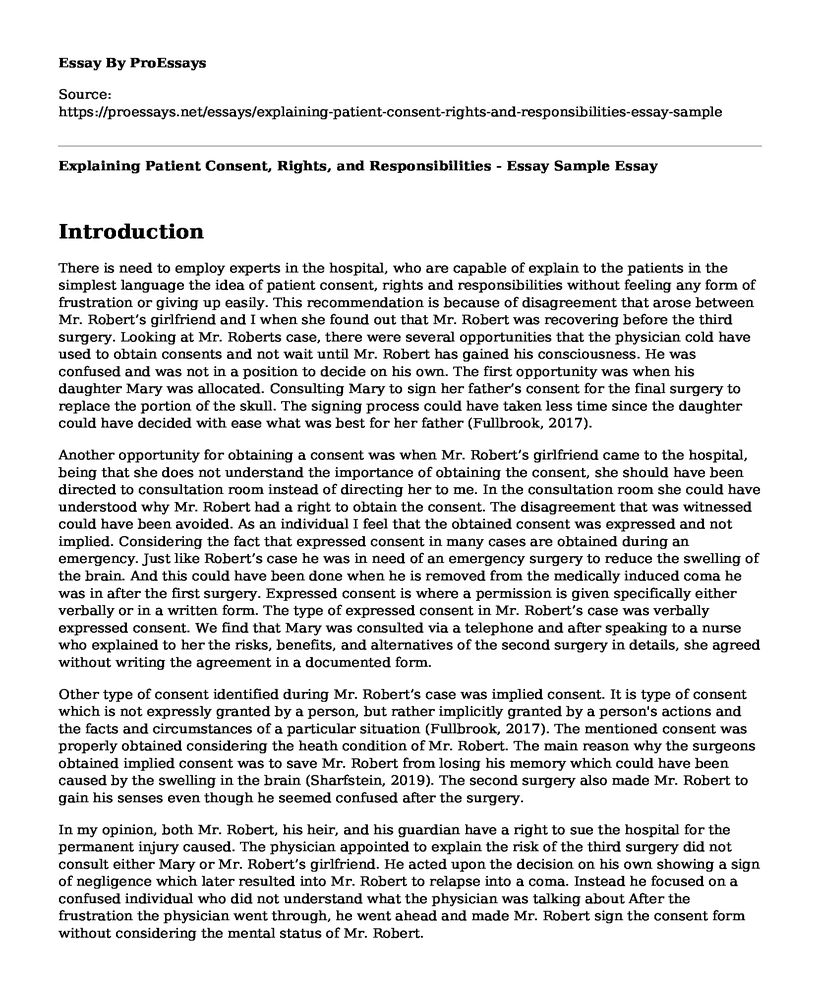Introduction
There is need to employ experts in the hospital, who are capable of explain to the patients in the simplest language the idea of patient consent, rights and responsibilities without feeling any form of frustration or giving up easily. This recommendation is because of disagreement that arose between Mr. Robert’s girlfriend and I when she found out that Mr. Robert was recovering before the third surgery. Looking at Mr. Roberts case, there were several opportunities that the physician cold have used to obtain consents and not wait until Mr. Robert has gained his consciousness. He was confused and was not in a position to decide on his own. The first opportunity was when his daughter Mary was allocated. Consulting Mary to sign her father’s consent for the final surgery to replace the portion of the skull. The signing process could have taken less time since the daughter could have decided with ease what was best for her father (Fullbrook, 2017).
Another opportunity for obtaining a consent was when Mr. Robert’s girlfriend came to the hospital, being that she does not understand the importance of obtaining the consent, she should have been directed to consultation room instead of directing her to me. In the consultation room she could have understood why Mr. Robert had a right to obtain the consent. The disagreement that was witnessed could have been avoided. As an individual I feel that the obtained consent was expressed and not implied. Considering the fact that expressed consent in many cases are obtained during an emergency. Just like Robert’s case he was in need of an emergency surgery to reduce the swelling of the brain. And this could have been done when he is removed from the medically induced coma he was in after the first surgery. Expressed consent is where a permission is given specifically either verbally or in a written form. The type of expressed consent in Mr. Robert’s case was verbally expressed consent. We find that Mary was consulted via a telephone and after speaking to a nurse who explained to her the risks, benefits, and alternatives of the second surgery in details, she agreed without writing the agreement in a documented form.
Other type of consent identified during Mr. Robert’s case was implied consent. It is type of consent which is not expressly granted by a person, but rather implicitly granted by a person's actions and the facts and circumstances of a particular situation (Fullbrook, 2017). The mentioned consent was properly obtained considering the heath condition of Mr. Robert. The main reason why the surgeons obtained implied consent was to save Mr. Robert from losing his memory which could have been caused by the swelling in the brain (Sharfstein, 2019). The second surgery also made Mr. Robert to gain his senses even though he seemed confused after the surgery.
In my opinion, both Mr. Robert, his heir, and his guardian have a right to sue the hospital for the permanent injury caused. The physician appointed to explain the risk of the third surgery did not consult either Mary or Mr. Robert’s girlfriend. He acted upon the decision on his own showing a sign of negligence which later resulted into Mr. Robert to relapse into a coma. Instead he focused on a confused individual who did not understand what the physician was talking about After the frustration the physician went through, he went ahead and made Mr. Robert sign the consent form without considering the mental status of Mr. Robert.
References
Fullbrook, S. (2017). Consent: the issue of rights and responsibilities for the health worker. British journal of nursing, 16(5), 318-319. Retrieved from https://www.magonlinelibrary.com/doi/abs/10.12968/bjon.2007.16.5.23018
Sharfstein, S. S. (2019). The President" s Advisory Commission on Consumer Protection and Quality in the Health Care Indus-try. Improving mental health care: commitment to qual-ity, 5. Retrieved from https://scholar.google.com/scholar?hl=en&as_sdt=0%2C5&q=President%E2%80%99s+Advisory+Commission+on+Consumer+Protection+and+Quality+in+the+Health+Care+Industry.+%281997%2C+November&btnG=
Cite this page
Explaining Patient Consent, Rights, and Responsibilities - Essay Sample. (2023, Aug 21). Retrieved from https://proessays.net/essays/explaining-patient-consent-rights-and-responsibilities-essay-sample
If you are the original author of this essay and no longer wish to have it published on the ProEssays website, please click below to request its removal:
- Xarelto/Rivaroxaban
- Global Cities and Governance Essay Example
- Essay Sample on Schools and Preventing Obesity
- Research Paper on Background of the Gap in Nursing Education
- Essay Sample on Improving Patient Quality and Safety: Guidelines & Evidence-Based Practices
- Essay on the Red Cross: 97 Million Volunteers United for Humanitarianism
- Donald Trump Tries to Erase Tweets Blasting Journalists on Coronavirus Response - Essay Sample







